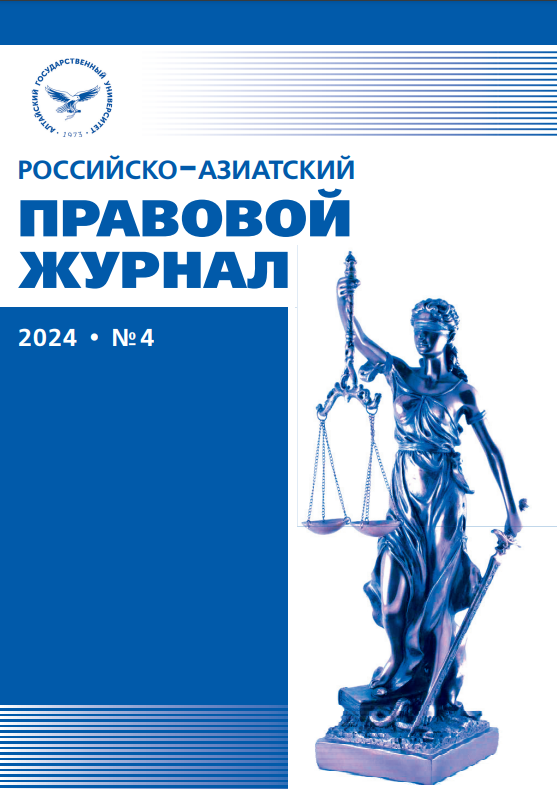COMPARATIVE LEGAL ANALYSIS OF THE NORMS REGULATING NON-CONTRACTUAL CROSS-BORDER RELATIONS IN THE LEGISLATION OF THE PRC AND THE RUSSIAN FEDERATION
УДК 341.9 ББК 67. 930.0
Abstract
xPRC legislation in the current conditions is of significant interest to the Russian legal community. Thenorms of private international law are of particular importance as a basis for the development of tradeand economic relations between the Russian Federation and the People's Republic of China. In particular,Russian counterparties and individuals cannot but be interested in the norms devoted to the regulation ofnon-contractual cross-border relations in the PRC legislation. In this regard, the author aimed to analyse thePRC Law «On the Application of Law to Transnational Civil Law Relations», to identify its similarities anddifferences with the provisions recorded in the Civil Code of the Russian Federation, using a comparativelegal approach. The study concluded that to a large extent the substantive regulation of non-contractualcross-border liability in the Russian and Chinese jurisdictions coincides. At the same time, in some casesthere are obvious differences in the scope of such regulation, as well as inconsistency of the list of regulatedsituations between the Civil Code of the Russian Federation and the Law of the People's Republic of China«On the Application of Law to Transnational Civil Law Relations».
Downloads
References
Седьмой Пермский конгресс ученых-юристов: сборник научных статей / В.В. Акинфиева, Л.А. Аксенчук, А.А. Ананьева и др.; отв. ред. В. Г. Голубцов, О.А. Кузнецова (Пермь, 18–19 ноября 2016 г.). М. : Статут, 2017. 592 с. // СПС «Консультант Плюс»;
Внедоговорные обязательства в международном частном праве : монография / В.Н. Борисов, Н.В. Власова, Т.П. Лазарева и др.; отв. ред. И.О. Хлестова. М. : ИЗиСП, НОРМА, ИНФРА-М, 2017. 160 с. // СПС «Консультант Плюс».
Козина А.Е. Коллизионное регулирование института действий в чужом интересе без поручения (negotiorum gestio) // Коммерческий арбитраж. 2021. N 2. // СПС «Консультант Плюс».
Синицын С.А. Международное частное право: некоторые тенденции развития, традиционные и новеллизационные институты // Журнал российского права. 2024. N 1. С. 35–52 // СПС «Консультант Плюс».
Крупко С. Коллизионно-правовые аспекты регулирования интеллектуальной собственности // Хозяйство и право. 2014. N 11 (Приложение). С. 3–64 // СПС «Консультант Плюс».
Международное частное право: учебник: в 2т. / Е.А. Абросимова, А.В. Асосков, А.В. Банковский и др.; отв. ред. С.Н. Лебедев, Е.В. Кабатова. М. : Статут, 2015. Т. 2: Особенная часть. 764 с. // СПС «Консультант Плюс»;
Copyright (c) 2024 М.В. Лицкас

This work is licensed under a Creative Commons Attribution 4.0 International License.
Russian-Asian Law Journal is a golden publisher, as we allow self-archiving, but most importantly we are fully transparent about your rights.
Authors may present and discuss their findings ahead of publication: at scientific conferences, on preprint servers, in public databases, and in blogs, wikis, tweets, and other informal communication channels.
Russian-Asian Law Journal allows authors to deposit manuscripts (currently under review or those for intended submission) in non-commercial, pre-print servers such as ArXiv.
Authors who publish with this journal agree to the following terms:
- Authors retain copyright and grant the journal right of first publication with the work simultaneously licensed under a Creative Commons Attribution License that allows others to share the work with an acknowledgement of the work's authorship and initial publication in this journal.
- Authors are able to enter into separate, additional contractual arrangements for the non-exclusive distribution of the journal's published version of the work (e.g., post it to an institutional repository or publish it in a book), with an acknowledgement of its initial publication in this journal.
- Authors are permitted and encouraged to post their work online (e.g., in institutional repositories or on their website) prior to and during the submission process, as it can lead to productive exchanges, as well as earlier and greater citation of published work (See The Effect of Open Access).








